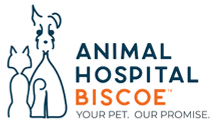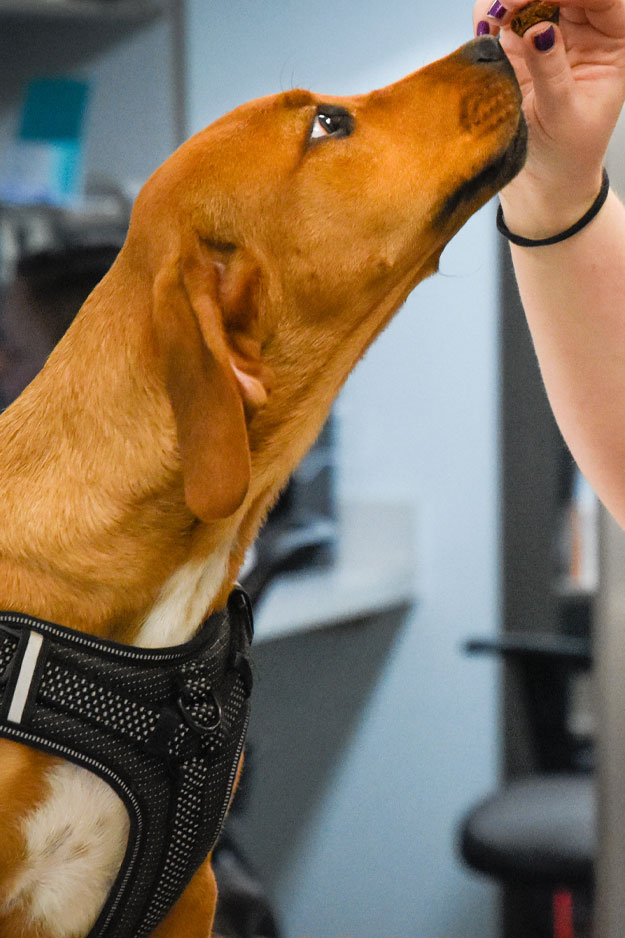
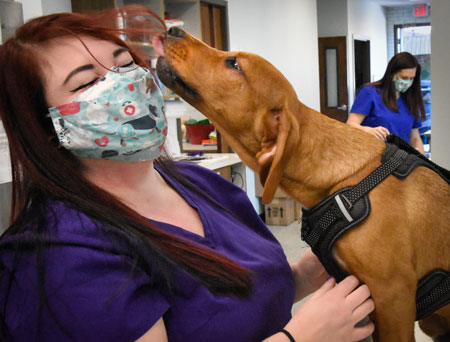
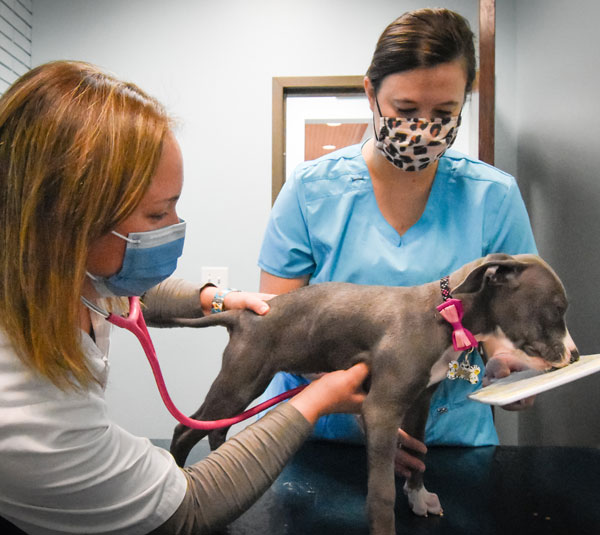
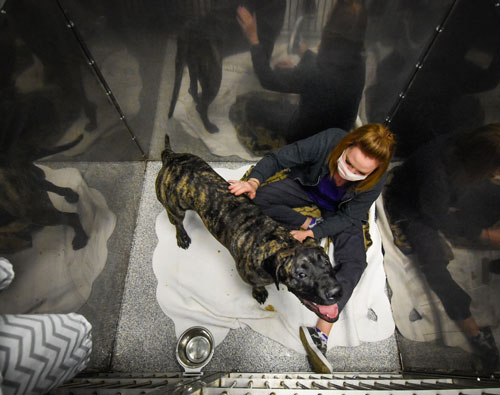
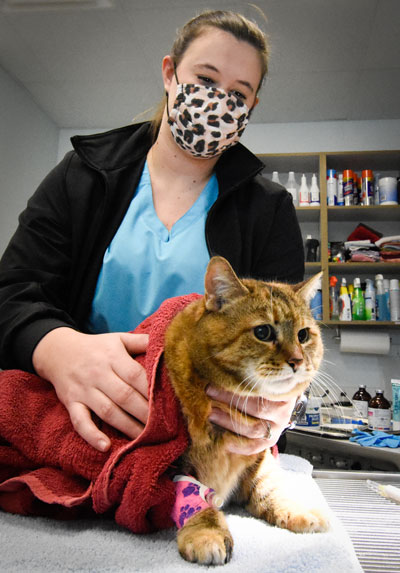
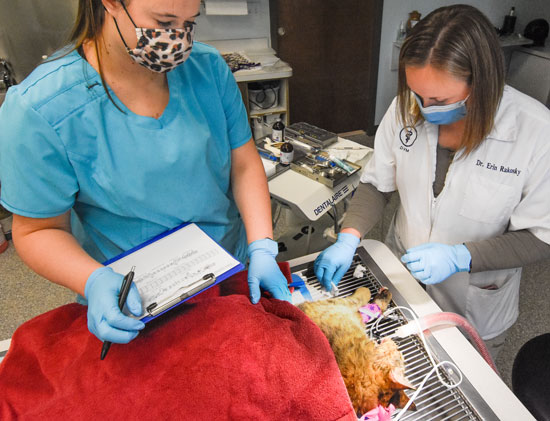
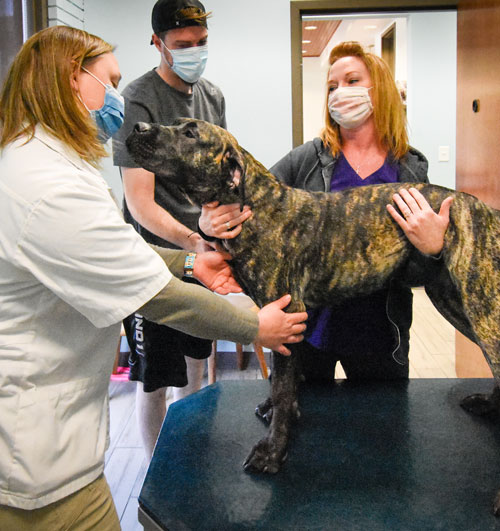
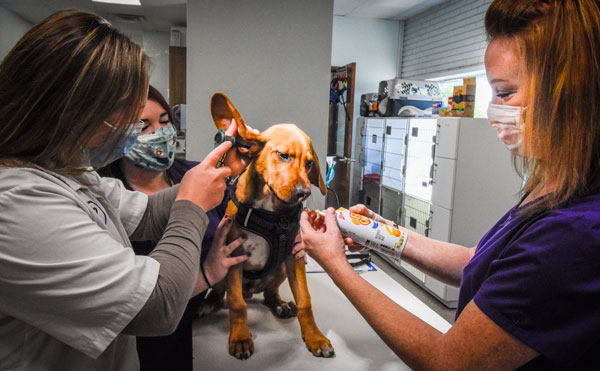
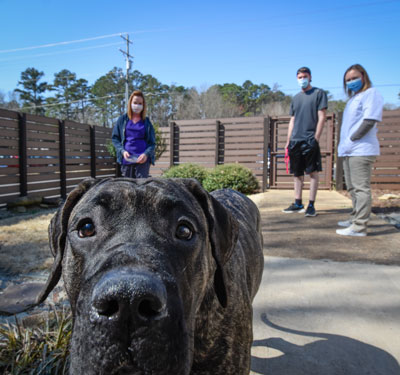
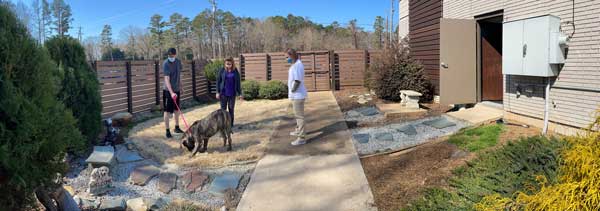
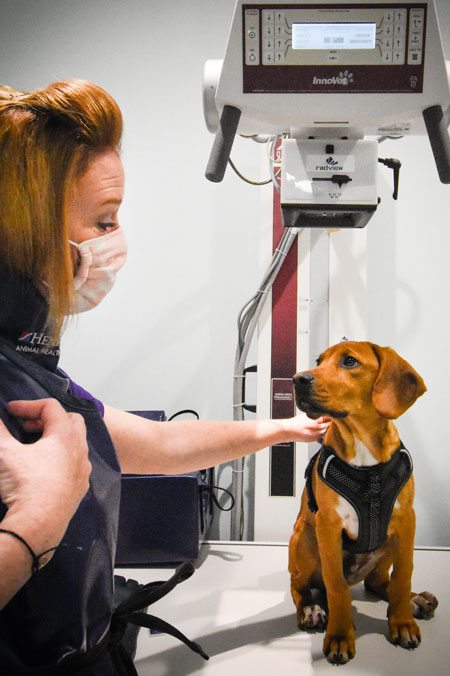
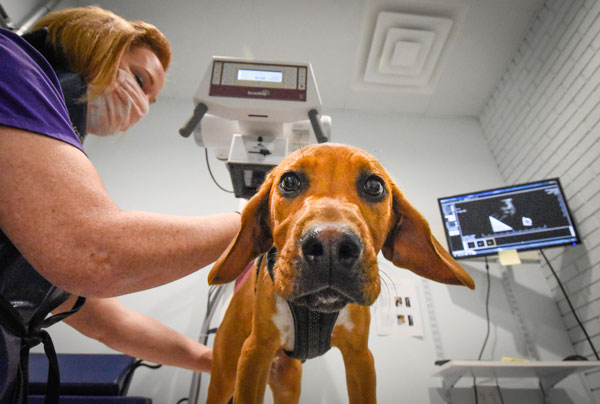
Services
Pet Wellness Services
Animal Hospital Biscoe is at the forefront of providing comprehensive care specifically designed to meet your pet’s unique needs. After all, your pet is special and he or she is a very important member of your family.
Bi-Annual Exam
A thorough physical exam is the foundation of your pet’s health care. It is critical to the care of your pet, from puppyhood to the golden years. Since one dog or cat year is approximately equal to seven human years, much can happen to your pet during this period of time. As a result, we recommend semi-annual physical examinations for your pets.
Our veterinarians devote at least a half-hour of time to your pet’s wellness exam. This allows us to do a thorough examination and advise you on all aspects of your pet’s care, including nutrition and behavior. We listen to your pet’s heart and lungs, evaluate his or her vision, check for unusual lumps and skin problems, look at your pet’s teeth and oral cavity and check your pet’s joints for swelling or stiffness. As part of your pet’s complete physical examination, we may also perform various laboratory tests. These include fecal centrifugation for detecting intestinal parasites, blood tests for detecting heartworms and tick-borne illnesses such as, Anaplasma, Lyme Disease, and Ehrlichia, and general blood screenings to identify potential medical problems and conditions. It is our goal to help you keep your pet in such good health that we see him or her only for wellness visits.
After each comprehensive physical exam your veterinarian will provide you with a Pet Exam Report Card. The Pet Exam Report Card is easy to read and can be shared with family members unable to attend the appointment. The report card is a specific health and immunization plan to your pet’s unique lifestyle and needs. A copy of the Pet Exam Report Card is kept in your pet’s medical file.
Examinations are an essential step in detecting problems before they become serious health issues. Regular wellness exams are the best way to keep your pet healthy and prevent disease and illness before they become difficult–and costly–to treat.
Pet Parasite Prevention & Dermatology
Parasites can be a pain for your pet–and your family! External parasites, such as, fleas and ticks and internal parasites, such as, heartworms, roundworms, and hookworms are common in pets. Many parasites, including fleas, ticks, and hookworms, are zoonotic, which means they can affect you and your family as well as your pet.
Randolph Animal Hospital recommends routine laboratory testing for heartworm and feline retroviruses as well as centrifugal fecal flotations to screen for intestinal parasites.
Fleas live year-round in North Carolina and infestations can lead to more serious skin diseases and allergic skin reactions.
Our hospital has a full array of medications available for parasite prevention. There are many different types available, and Animal Hospital Randolph works with you to determine which product is best suited for your pet.
Vaccinations and Preventive Care
Vaccinations are the cornerstone of your pet’s preventive health care plan. Advances in veterinary immunology have made diseases that once were fatal to pets easily prevented. Today, many immunizations and preventive treatments are available that did not exist just a few years ago. We always tailor your pet’s vaccination schedule according to his or her needs. All decisions about vaccinations and preventive care are made jointly by the veterinarian and you in order to develop a vaccination protocol based on your pet’s lifestyle, environment, and other risk factors.
Microchipping
Each year, millions of pets go missing, and many never make it back to their homes. Implanting a microchip in your pet is a simple way to avoid this tragedy.
A microchip which is about the size and shape of a grain of rice, is implanted beneath a pet’s skin between the shoulder blades and stays there for the pet’s entire life. This procedure is as easy as a vaccination.
Each microchip has a unique number. This number, along with information about the owner and pet, are added to a national pet registry. Most veterinary hospitals and animal shelters have electronic scanners that are equipped to detect and read these implanted microchips. If a lost pet is found and a microchip is scanned, the registry is called, and the owner can be contacted.
Here at Animal Hospital Biscoe, we use HomeAgain TempScan microchips that check your pet’s body temperature when we scan it. These microchips include a lifetime monitoring membership.
Nutrition
We know how important a quality diet is to your pet’s overall health. During your pet’s comprehensive physical examination we evaluate his or her body condition and give recommendations. Some pets require special food to maintain optimum health, but all pets benefit from a balanced, healthful diet. We have trained staff available to help you with nutritional challenges for your pet and a diverse inventory of prescription foods.
We can also offer advice and provide information about diets that benefit specific medical conditions such as liver disease, bladder and kidney stones, renal failure, food allergies and other conditions.
The staff at Animal Hospital Biscoe is always available to help you choose the right diet for your pet in order to keep him or her happy, healthy and active.
Nutraceuticals
Nutraceutical, a term created from combining the words nutrition and pharmaceutical, is a food or food product that provides health and medical benefits, including the prevention and treatment of disease. Such products may range from isolated nutrients, dietary supplements and specific diets to herbal products, cereals, soups and beverages.
In light of the claims and miraculous properties of various natural compounds, we have researched and selected the products that we feel are most beneficial for your pet’s health. Our research is based on veterinary literature and information gleaned from speakers and advisors at veterinary conferences.
Some of the products that we carry and recommend include metal free liquid and encapsulated fish oil, glucosamine and chondroitin (Glyco-flex III®), L-Lysine capsules (to help treat symptoms of Feline Herpes), Flavored Vitamins (tablets and liquids), hairball remedy, nutritional support products (Nutrical®), Hepatic (liver) support formulas (Hepatosupport® and Denamarin®), and probiotics (to support intestinal health and immune function).
Behavioral Counseling
Behavior problems are the number one reason that owners give up a pet. Animal Hospital Biscoe offers behavior counseling for many of your pet’s problems including inappropriate urination or defecation, aggression, separation anxiety, inappropriate chewing and barking, introduction of new pets into the household and household pets that are in conflict with one another. Oftentimes a behavior problem, such as inappropriate voiding, can be linked to a medical issue (cystitis, bladder stones, and kidney disease).
Animal Hospital Biscoe maintains an extensive library of information about behavior problems. Our veterinarians help you recognize, validate and categorize behavior problems. We work closely with you in developing a specific plan to help eliminate your pet’s unwanted behavior. The treatment plan often includes behavior modification and medication-assisted training. If our veterinarians and technical staff members cannot help with your pet’s behavior problem, we can refer you to a board-certified animal behaviorist.
Diagnostics
Radiology
Radiology is the most common form of diagnostic imaging. Radiology allows us to view the shape, size and location of organs inside your pet’s body. Radiographs or X-rays are extremely helpful for diagnosing and monitoring many medical and surgical conditions. Radiographs are useful in examining your pet’s bones, lungs, heart, abdomen, oral cavity and other areas of the body. Radiographs can detect a fractured bone, joint disease, cancerous tumor, heart problem or locate an obstruction or foreign body in your pet’s stomach or intestine. We perform radiographs for evaluation and in certain instances, such as when issues in the hips are suspected.
Animal Hospital Biscoe uses the latest radiology equipment as part of your pet’s diagnostic care. Most radiographs are interpreted immediately by our experienced veterinarians. In complicated cases, your pet’s radiographs are sent to area radiology specialists. All this is done in order to provide your pet with the best care and treatment possible.
Blood Pressure Monitoring
High blood pressure can be just as dangerous for your pet as it is for you. High blood pressure–also known as hypertension–is far more common in pets than many people realize and can cause a number of serious illnesses such as renal disease, heart disease, diabetes, hypothyroidism and more.
Blood pressure is also an important consideration during surgery because increases or decreases in blood pressure can indicate a serious surgical issue such as a negative reaction to anesthesia.
For these reasons, we recommend regular blood pressure screenings for your pet during routine wellness checkups. This allows your veterinarian to set a baseline blood pressure for your pet as well as notice if there is any indication of hypertension. However, measuring your pet’s blood pressure accurately can be a bit tricky. Not only do our pets not like to stand still while their blood pressure is being read, their fur and small veins makes getting an accurate measurement difficult.
This is why your veterinarian may use an ultrasonic Doppler blood pressure monitor. These are highly reliable and accurate instruments that allow your veterinarian to easily and painlessly measure your pet’s blood pressure. After your pet’s blood pressure has been measured, your veterinarian will explain the results and provide treatment options if necessary. Your veterinarian will also discuss with you home care strategies to prevent hypertension in your pet as well as the signs and symptoms of hypertension.
Otoscopic Examination
An otoscopic examination of your pet’s ears is an important part of your pet’s regular wellness checkups. During your pet’s lifetime, he or she may develop a number of painful and sometimes dangerous conditions in their ears. These can include ear mites, infections, hair balls and other foreign objects lodged in the ear, as well as damage to the ear canal and ear drum.
Since early detection of these issues is important to preventing serious illness and hearing loss, your veterinarian will examine your pet’s ears using an otoscope. By looking into the ear with an otoscope, your veterinarian is able to look for signs of infection, ear mites, foreign objects, and any other indications of underlying disease in or around the ear. Your veterinarian is also able to check the health of the ear drum, which can provide important information as to the health of the middle ear. This is where the mechanisms for hearing and balance are located.
The otoscopic examination takes only a few moments and does not cause any pain or discomfort to your pet. Once completed, your veterinarian will discuss with you the health of your pet’s ears as well as any treatment options if necessary. Your veterinarian will also provide you with information on the signs and symptoms that may indicate an issue with your pet’s ears as well as instructions for proper ear care at home.
Tonometry (Glaucoma Testing)
Glaucoma doesn’t only affect humans; your pet can develop it too. Glaucoma is a condition in which the fluid pressure inside the eye increases to a point where the optic nerve is damaged, causing loss of vision and blindness. Glaucoma can develop as your pet ages–this is known as chronic glaucoma–or as the result of an injury or illness–this is known as acute glaucoma. In many cases glaucoma can progress quite rapidly–especially when it is the result of injury or underlying illness–and is considered an emergency situation. Symptoms to look for include:
- Redness in the eye.
- Tearing or discharge.
- Eye sensitivity to light.
- Pain.
- The eye may look cloudy
- Bulging eyeball
Due to the severity and incidence of glaucoma, we recommend that you have your pet checked regularly for this disease. A routine glaucoma exam is not only an effective screening measure for chronic and acute glaucoma but can also help set a baseline measurement for your pet. Setting a baseline measurement is important because normal Intraocular Pressure (IOP) can vary between species, breeds and even individual pets.
Your veterinarian will most likely use an instrument called a Tonometer to measure the fluid pressure inside your pet’s eyes. It is a noninvasive procedure that should not cause your pet any pain or discomfort; though your veterinarian will apply a mild anesthetic eye-drop to ensure your pet is comfortable during the exam.
The examination is very quick to perform and once done, your veterinarian will explain your pet’s measurement, what it tells us about the health of your pet’s eyes and provide any treatment options if necessary.
Diagnostic Laboratory
Blood and laboratory tests are often very helpful in making an accurate diagnosis of your pet’s condition and as an indicator of your pet’s overall health. Many conditions can only be detected with laboratory tests such as blood testing, biopsies, microscopic examinations and bacterial culture or sensitivity.
We are equipped with sophisticated instruments that allow us to measure many laboratory values. In addition to our offsite laboratory services, our in-house diagnostic capabilities allow us to get results pre-surgically or in an emergency within minutes.
Our extensive laboratory services provide information that is critical to your sick or injured pet. Our technicians are highly trained at performing laboratory tests and many results are available within minutes. Along with our laboratory capabilities, we also work with several outside referral laboratories if your pet requires more specialized testing.
Surgery
Advancements in veterinary care have allowed surgical procedures to be much safer than ever before. At Animal Hospital Biscoe, you can be confident that your pet will be provided the highest quality of care with the most compassionate approach. This includes the latest pain management protocols, the most advanced monitoring equipment, and the safest anesthesia available, all under the supervision of our highly trained technical staff. IV fluid therapy maintains blood pressure, replaces blood loss, speeds recovery and can be used to administer emergency lifesaving drugs. An IV catheter will be placed, and fluids administered to all pets six years and older. We do offer and recommend this to patients of all ages.
Anesthesia and Monitoring
In our continuing efforts to provide both you and your pet with the best and most advanced surgical care possible, we have invested heavily in the latest anesthetic administration and cardiovascular monitoring equipment. Surgeries are performed in our state-of-the-art surgery suite where the most up-to-date pain management techniques and the safest anesthetic agents are used.
Anesthesia is individualized for your pet based upon a number of factors including the type of procedure, his or her pre-existing conditions, blood test values, age, breed and prior anesthetic experience. We limit the amount of anesthesia by employing pre-medications and sedatives.
During anesthesia and surgery, your pet is constantly monitored by a trained veterinary technician as well as with an advanced electronic monitoring device that measures vital parameters such as pulse oximeter and capnomitry. Additionally, your pet receives IV fluids to maintain blood pressure and hydration.
Surgery
Staffed by a team of highly trained veterinarians and experienced veterinary technicians and assistants, we are proud to provide you and your pet with a wide range of surgical procedures.
In addition to standard neuter/spay procedures, the veterinary surgeons at Animal Hospital Biscoe are qualified to perform advanced surgical procedures including ophthalmic (eye), otic (ear), orthopedic (bones and joints), gastrointestinal (stomach and intestines), and urogenital (kidney, bladder and reproductive organs).
You and your pet also benefit from the expertise of our well qualified staff. Our veterinary technicians and assistants have decades of experience and receive continuing education on a regular basis. Working alongside the surgeons, these technicians keep a very close watch on your pet both during and after surgery.
Pain Management
Like us, your pet feels pain and discomfort. Recognizing and alleviating pain in your pet is the essence of good veterinary care. Our standard hospital procedure is based around pain elimination and we are dedicated to perfecting that art. We want to provide your beloved pet with a painless and stress-free experience.
Pain management is an important part of our intra- and post-surgical protocols. The less pain your pet experiences, the faster his or her recovery time will be. We provide pain medication to all pets following surgery. At discharge, we may send additional pain management medication home with you and your pet. Management of your pet’s pain is a top priority throughout time he or she is under our care.
Our commitment to providing the highest quality care and comfort to you and your beloved pet extends well beyond our four walls. We welcome your visit and your questions.
Dental Care
Your pet’s dental health is extremely important! Veterinary dental care is about more than just preventing “doggy breath” because regular dental care can help prevent serious diseases and infections. Routine dental cleanings are a vital part of your pet’s preventive health care plan.
Why Dental Care is Important
It is estimated that more than 80 percent of dogs and 70 percent of cats develop tooth and gum disease by the age of three years. As plaque builds up on your pet’s teeth, it hardens into tartar and damages the teeth and gums. This results in the disease known as gingivitis. Signs of gingivitis include bad breath and reddened gums. If left untreated, gingivitis can cause periodontal disease, which is a serious painful infection that can damage the teeth and gums and lead to health problems elsewhere in your pet’s body. If your pet is exhibiting any of the following symptoms, he or she may have periodontal disease:
- Discomfort while chewing
- Difficulty swallowing
- Pawing at the mouth
- Inflamed or bleeding gums.
- Bad breath
Regular dental cleanings remove plaque and tartar and prevent gingivitis and periodontal disease.
What Happens During a Cleaning?
Your pet’s dental cleaning is far different than the same procedure you undergo at your dentist’s office. Because anesthesia is required to keep your pet safe and still during the cleaning, we perform a thorough physical examination and blood tests to ensure that your pet is healthy enough for this procedure. These tests also help us develop an anesthetic protocol that is specific to your pet.
Once anesthesia is administered, the cleaning begins. We use modern and safe ultrasonic equipment to remove tartar and plaque, both above and below the gum line. Our specially trained dental technicians polish you pet’s teeth, which creates a smooth, lustrous surface that is more resistant to plaque buildup.
Dental Care at Home
Prevention is the best protection from periodontal disease.
Preventing periodontal disease by keeping your pet’s teeth and gums healthy isn’t just a job for your veterinarian. It’s your job, too. While nothing can take the place of regular visits to the veterinarian for checkups and cleaning, ongoing follow-up oral care at home is just as important in controlling plaque and tartar formation.
In order for any dental program to work properly, home care follow up is essential. The goal of dental home care is to remove plaque, before it mineralizes into calculus, a process that occurs within days of a teeth cleaning. Brushing your pet’s teeth is the single most important procedure you can do to maintain good oral health. If performed regularly, brushing dramatically decreases the incidence of gingivitis and increases the interval between teeth cleaning appointments.
Home care is best started at a young age, before the adult teeth erupt. The younger the animal is, the more likely he or she is to accept it. Regular brushing not only keeps your pet’s teeth clean and healthy, but it also enhances the bond between you and your pet. If you are unsure of how to brush your pet’s teeth, you may want to ask a staff member at Randolph Animal Hospital for instructions. There is nothing better than a hands-on demonstration. You can also view a video created by C.E.T Home Dental Care on how to brush your pet’s teeth. Remember, always use tooth paste for pets, not for people.
If brushing your pet’s teeth is not possible, dental rise or giving prescription chew hides aids in reducing the accumulation of dental plaque.
Senior Pet Care
Senior Pet Care
Older pets have special health care needs and may require more attention and care than younger pets. As your pet ages, changes occur in his or her physical condition that warrants more frequent visits to the veterinarian. If medical problems are recognized and treated when they are first detected, the treatment may be easier for your pet and less costly for you. Twice-a-year wellness examinations are recommended for older dogs and cats to potentially diagnose medical problems in the early stages.
A geriatric exam is more extensive than a simple checkup and includes a complete physical exam, oral and rectal examination and recording of body weight and body condition. Your veterinarian also examines your pet’s ears, eyes, and various internal organs. Some laboratory work may be done, including a complete blood count, urinalysis, fecal exam, and perhaps endocrine blood tests and other examinations such as, EKG or eyes tests for glaucoma. If these tests prove to be normal, that is great news and will help us establish a baseline for your pet.
The aging process varies between species and specific breeds as well as individual animals. Most cats become seniors slightly later than dogs, between their eight and tenth year, whereas dogs, dependent upon breed and size, could be considered senior as early as 5 years or as late as 10 years. Even though cat owners may disagree, this is one area where dogs present more complexity than cats! As a general rule, owners should start to consider their cat as senior around 8-10 years and 6-8 years for dogs.
As dogs and cats grow older, their organs may become less efficient, and they may be less able to resist infections and other diseases. As a responsible pet owner, you want your pet to remain healthy and active for as long as possible so it is important to be aware of any condition that may warrant your veterinarian’s attention.
Signs of Aging in Dogs
- Your dog’s coat and the area around his muzzle begin to turn gray.
- Skin problems may occur more often since the skin may be thinner, less elastic, and does not repair itself as quickly.
- Your senior dog begins to slow down, has less energy and has trouble getting up or limps.
- Longer and more frequent naps are common side effects of aging.
- A change in habits, including play preferences and eating or drinking habits is commonly observed in older dogs.
- Weight changes are common in older dogs. Some dogs gain weight as they age while others lose weight.
- Dental problems that present as bad breath are more likely to appear in older pets.
- Hearing, vision and other senses become less acute when dogs get older.
Signs of Aging in Cats
- The two most common abnormalities in the older cat are kidney disease and hyperthyroid (overactive thyroid) that are easily detected with blood testing.
- As old cats are often less active, their muscle tone tends to reduce which may further reduce their ability to run, jump and climb. Lack of exercise contributes to the stiffening of joints. The decreased activity level may be due to joint disease.
- Frequently, older cats suffer from a poor appetite as the senses of taste and smell often deteriorate with age. Teeth problems are common and can discourage eating.
- Bowel function may deteriorate with age, causing problems such as reduced ability to absorb food nutrients. This can lead to weight loss. Some elderly cats suffer from constipation.
- Elderly cats have decreased thirst and they are at risk of becoming dehydrated. This is particularly dangerous in cats with kidney problems.
- Older cats tend to sleep less heavily, but more frequently.
- Elderly cats often have poor coats that may make them less resistant to the cold and wet. Some older cats do not groom themselves as well as they once did. Watch for problems with nails overgrowing, due to less activity.
General Tips for your Aging Pet
Diet–There are several reasons why a special diet may be needed for an elderly pet. He or she may be less active than a younger animal, and therefore may require fewer calories. The digestive organs may become less efficient in digestion and absorption, and a highly digestible diet may be more appropriate. Under certain circumstances the vitamin and mineral needs of elderly pets may be different from those of younger animals. Some of the special senior diets have mineral and vitamin content carefully adjusted to help provide the appropriate balance for elderly pets that have failing kidney or heart function.
Joints–As your pet gets older, joint pain and stiffness may develop. This may mean that your pet becomes less active and his or her energy level may decrease. Your pet may become tired more easily and want to nap more often. Dogs with arthritis should still be exercised. However, they may need a diet containing fewer calories to prevent them from putting on weight. For additional information on joint care visit Nutraceuticals .
Hearing, Sight and Smell– These senses can all become less acute with age and you may need to make allowances for these changes. Watch for signs of impaired sight such as bumping into furniture, or loss of hearing if your pet stops reacting to its name or commands. These changes may lead to behavior changes. Eye infections, cataracts, decreased night vision, or even blindness is common. However, these can also be symptoms of a larger problem. Your veterinarian can help you distinguish between the normal aging process and an acute problem.
Dental–Older pets are more likely to develop tooth and gum conditions. If your pet has painful gums or loose teeth, he or she may be reluctant to eat. Gum disease not only leads to loss of teeth but can also cause heart and kidney infections if bacteria enter the bloodstream through the inflamed gums. Examine your pet’s mouth regularly and ask your veterinarian for advice if the teeth or gums do not look healthy.
Urinary–Often associated with hormonal imbalance in spayed females or a disorder of the nervous system that controls bladder function, urinary incontinence or inappropriate urination is common in an aging pet. Inappropriate urination may also be the result of a urinary tract disorder, prostate problem or symptomatic of a larger problem. Consult your veterinarian if your pet becomes incontinent or begins to urinate more frequently.
Behavior–As your pet ages, his or her behavior may change significantly. You might interpret this as simple aging, but it actually might be due to a treatable geriatric disease, such as cognitive dysfunction. Some typical signs include confusion, disorientation, decreased activity, changes in the sleep/wake cycle, loss of housetraining, and signs that suggests a decrease in your dog’s interest in, or ability to interact with his environment or with you.
Kidneys–Excessive thirst and frequent or uncontrolled urination are often signs of kidney problems or diabetes. Since the kidneys process and eliminate body waste products into the urine, it is important that these organs remain healthy. If your pet’s kidneys are not functioning properly, your veterinarian may recommend a diet specially designed for kidney problems.
Even if your pet seems perfectly healthy, regular geriatric checkups are important to manage many of the changes associated with aging. Dogs and cats over seven years of age should be examined by a veterinarian at Randolph Animal Biscoe twice a year. Your pet can be the most rewarding when he or she reaches middle or old age; Your pet knows you, has a special routine, and has spent years as your companion. Maintaining the health of your aging pet is a part of your mutually beneficial relationship and can provide both of you with many more years of love and companionship. Remember, age is not a disease.
End of Life
Assessing Quality of Life
The Quality-of-Life Scale
When evaluating quality of life in our pets, it can be a difficult and challenging concept to attempt to evaluate objectively. We have created a form to help you, a quality-of-life scale. Our goal with this scale is to provide a numeric scale to help evaluate your pet’s quality of life, as well as your family’s concerns. It is important to realize that quality of life not only applies to the pet but also applies to the entire family as well. Download the form here.
Sometimes, a healthy recovery or comfortable life is not possible. As caretakers for our pets, it is our responsibility to consider options for relieving our pet’s suffering.
In some circumstances, palliative care may be an option. A sick or elderly pet will often need extensive medical care in one or more of the following areas: nutrition, pain relief, hydration, temperature regulation, skin care, digestive support, or mobility.
In cases where medical intervention no longer improves health or provides comfort, euthanasia can be the best option for providing relief to a pet who is suffering.
The decision to euthanize a beloved pet is among the most difficult choices a pet owner ever has to make. Your veterinarian will meet with you to discuss the process and determine whether or not euthanasia is appropriate and if, or when, it should occur.
Euthanasia
When the time comes to say goodbye to your pet, we perform humane euthanasia in our office, in a quiet and comfortable environment by an experienced veterinarian. He or she will inject an anesthetic overdose into a vein through an IV catheter. Within a few moments, your pet will peacefully pass away. Because an anesthetic is used, pets do not experience any discomfort. The veterinarian will ensure that the heart, pulses and breathing have stopped.
Pet owners have the option to remain in the room during the procedure if they choose.
Memorializing Your Pet: Three Options
Animal Hospital Biscoe offers three “Saying Goodbye” options to memorialize your beloved pet after Euthanasia. We have an on-site crematory so you can be assured of the service you are promised.
- Home Burial Should you choose to bury your pet on your personal property, we can provide pet burial boxes.
- Communal Cremation With communal cremation, your pet is gently placed into the crematory together with other pets. When the cremation process is complete, the communal remains are collected and spread on land bordering the Uwharrie Forest. No cremated remains are returned to you when you choose a communal cremation.
- Individual Cremation Individual cremation provides you with the opportunity to keep your pet’s cremated remains as a permanent and personal keepsake. When you choose individual cremation, your treasured pet is individually cremated and their remains returned to you in a handmade urn, created by a local Seagrove, NC, artisan, Mack Chrisco. We hand seal each urn with wax.
Coping With Pet Loss
Pet Loss and Grief Support Sources
- Association of Pet Loss and Bereavement (aplb.org)
- Pet Loss Grief Support Website (petloss.com)
Request Appointment
Located at 302 North Main Street, Biscoe, North Carolina, 27208, Animal Hospital Biscoe provides complete veterinary medical and surgical care for dogs and cats from Biscoe, Montgomery County and surrounding areas in North Carolina.
